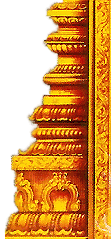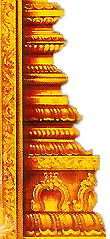10.1 Upasarams are three types. They are Saangam, Upaangam, and Prathyangam.
(1) Saangam: Abhishegam(Bathing) Paathyam(offering water for legs), Aasamanam(Offering three spoonful of water to drink), Vasthram(Dress), Aaparanam(Jewel), Vaasanai santhanam(Scented sandal paste), Arkyam(A spoonful of water for the hands), Offering of flowers.
(2) Upaangam: Inscense , Deepam, Applying sacred ash in the evenings, Umbrella(Kodai), Saamaram(Hand fan), Hand mirror, Dance, Singing of songs
(3) Prathyangam: Neivethyam(Offering of food), Shri Bali(Offering of cooked food), Homam, Nityothsavam(Daily festival), Surukothagam and Swathi vasanam(Recital of auspicious manthras)
10.2 Shodas upasarangal: Sixteen types of religious formalities. 1. Aavaganam(invoking the God in a picture or idol), 2. Sthabanam(establishing him in the picture or idol) 3. Paathyam 4. Aasamneeyam 5. Arkyam 6. Abishegam 7. Vasthram 8. Jewels and decoration with flowers. 9. Dhoopam(incense) and Deepam 10. Neivethyam 11. Shri Bali 12. Performing homam 13. Isai , Geetham(singing of devotional songs 14. Procession of Shri Bali Naayagar 15. Narthanam(Dance) 16. Uthvaasanam(Singing of songs euologizing the greatness og the God)
10.3 Aavaaganam: After decorating the Lord Shiva , He should be invoked in the idol or picture by reciting Sathyojatham Manthrams. There after HE should be established by reciting Vamatheva Manthras. Sanithanam by reciting Akora Manthrams, Sannirithanam by reciting Thathpurusha Manthrams, Smmukeekaranm by reciting Eesaana Manthrams.
10.4. AAVAAGANAM: Requesting the God in all humility and kindness to remain in front of us . Praying the lord “O” God please remain in this pot of holy water(Kalasam or Kumbam in tamil) till the pooja is over.
10.5 STHAABANAM: To make the God to establish himself in a particular place with our devotion.
10.6 SANNITHAANAM: “O” God, I am yours only Please bless me and also shower your blessings for the Pooja that I am going to conduct.
10.7. SANNINIRITHAM Requesting the God to remain with us till the end of the pooja.
10.8 While performing the Aavaganam, one should offer to the God Paathyam, Arkyam and aasamaneeyam.
10.9 WHAT AND WHERE? Paathyam should be offered in the legs, Aasmaneeyam in the hand,Arkyam on the head, Sandal paste should be applied on the body, the crown on the head. A flower should be kept on the crown. Dhoopam should be shown, near the nose, Deepam near the eyes . The cooked food should be offered as Neivethysam in the hands and so is the Thaamboolam( mixture of betel leaves, arecanut and lime)
10.10: Vilaamichcha root(A medicinal herb),Sandal paste,Grass, white mustard seeds(Ven kadugu in tamil) should be put in the water offered for Paathyam. Cardamom, clove, scented camphor, nutmug(Jaathikkai in tamil) should be added in the water meant for aasamaneeyam. Seasame(EL in tamil), Paddy, Tharpai(Holy grass)milk, Unbroken rice smeared with turmeric (Atchathai in tamil) white seasame Yavam (a variety of paddy) should be added in the water meant for Arkyam.
10.11 Time to offer Paathyam, Arkyam, Aasamaneyam: Before starting the abishegam, Towards the end of abhishegam. Before offering Neivethyam and after offering the neivethyam .While showing Dhoopam and Deepam . At the end of all the five periods. And at the end of pooja.
10.12 Eight types flowers should be offered during Aavaganam, Arkyam Abhishegam, Dhoopam,while applying sandal paste, Neivethyam , removal of the pooja idol/picture(Visarjanam)
1013: Deepa- Shodasa Upasaam: 1. Dhhopam2. Eka deepam 3. Alankaara Deeepam 4. Naaga Deepam 5. Rishaba Deepam 6. Purusha miruga Deepam,7.Soola deepam 8. Koorma deepam(Tortoise) 9. Gaja(elephant) deepam 10. Simha(Lion) deepam 11. Vyakra(Tiger) deepam, 12. Kodi deepam 13. Mayoora(Peacock) deepam, 14. Poorna Kumba deepam 15. Natchathra deepam, Meru deepam
10.14 Sulukothagam: Doing Moola Manthra japam as much as one can (in number). Doing circumambulation and pray “O” Paremeswara, Please accept my Bhakthi neivethyam. The fruits of the pooja should be given to Lord Shiva in his hands. Reduce your right hand palm size to four inches and take flower, theertham, and offer it at the feet of Lord Shiva. This is called Sulukothagam. There after keep sandal paste and flower in the hands and uttering the samhiha manthram offer it to Lord Shiva.
After the shodasa upasarangal offer cocanut, plantain fruit, Beeda(Thaamboolam in tamil) and lit camphor and show it to Lord Shiva. Then Sivachariyar should submit the sulukothagam and offer his prayers. He should do Moola Manthra japam as many number as possible and put water at the feet of Lord Shiva. Then put a flower in the hand of Lord Shiva.
10.15: Before the commencement of Pooja, at the end of abhishegam at the end of archana---during all these events Dhoopam(incense) and deepam should be shown.
10.16: Dhoopam will remove all sins. Deepam will destroy all enemies. Gada(Pot) deepam will get peace of mind. Showing the lit camphor will fetch you all good things in the heaven. Sacred ash will protect us in all the three worlds. Umbrella—longevity. Hand fan(Saamaram) Prosperity
10.17: How to perform Deeparadhan? By putting a flower on the deepam Nirrekshanam and Purokshanam (sprinkling of water on it) should be done. The deepam should be shown in front of the eyes and the dhhopamin front of the nose of the idol.
10.18: The deepam and dhoopam should be shown in front of the God’s ( in the form of “OM”) face, chest,stomach,legs,three times.





